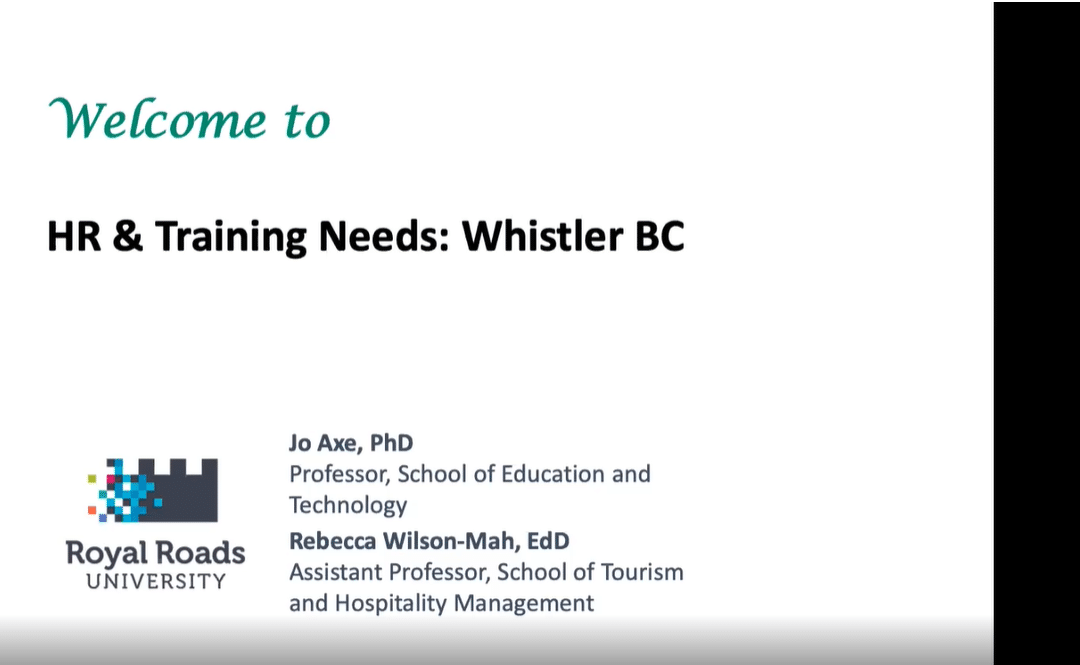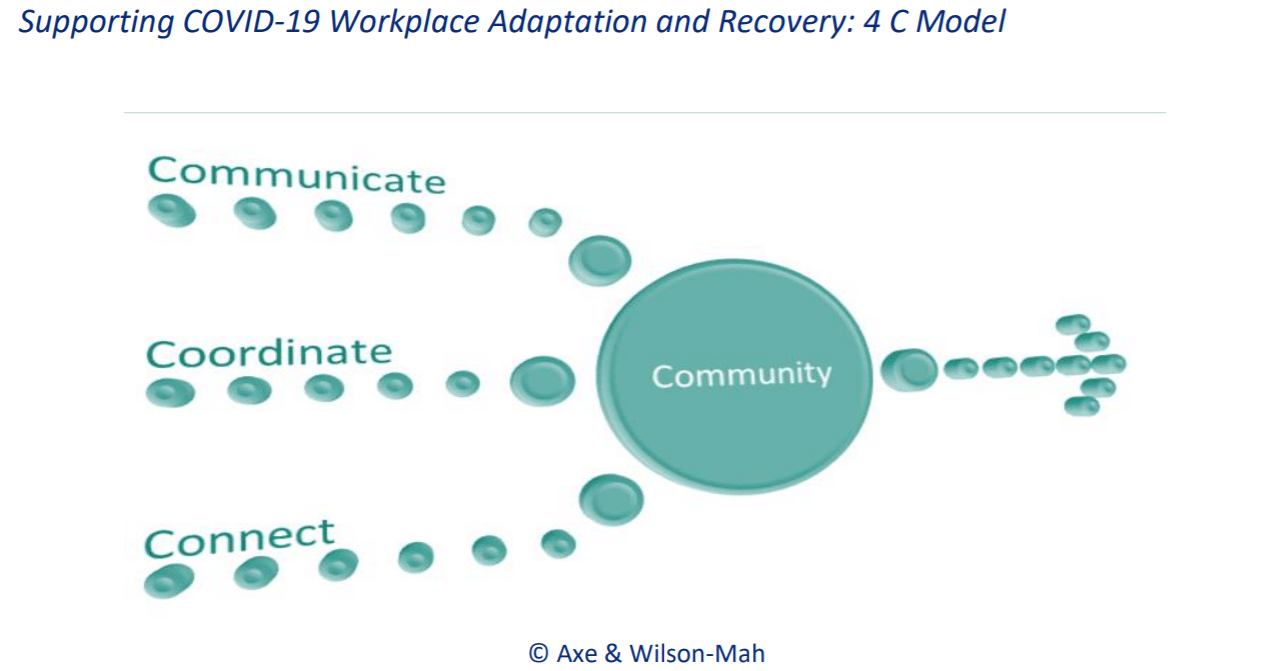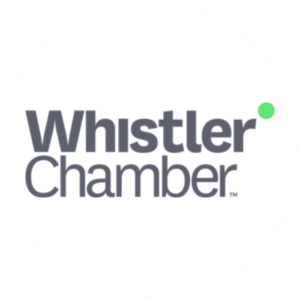For over twenty years, Zero Ceiling has operated a supportive employment program in Whistler for youth experiencing or at risk of homelessness. This program has helped about 100 young people set roots in our community and become employees at local businesses. Advocating for a strong, diverse economy with thriving businesses is part of what we do. In Whistler, COVID recovery will be a long, uncertain path.
Since the world went into lockdown, we, like everyone else, are wondering how Whistler will recover from COVID-19 and what it will cost us to keep our economy afloat. After a presentation by our friends and frequent collaborators at Royal Roads University, we got a clearer picture into the kind of actions that will need to happen to help businesses and non-profits to recover, and what they’ve already done to help the Whistler community adapt.
Back in September (which is six months ago in COVID-years), Zero Ceiling co-hosted an online event with Royal Roads University (RRU). In this presentation, Dr. Jo Axe and Dr. Rebecca Wilson-Mah from RRU talked through the findings of the research, which they had done in June 2020. The resulting report is very informative and gives us a look at what Whistler businesses and non-profits need in the coming months as we collectively look towards recovery.
We were very proud to have been a part of this project and thankful to both the RRU research team, as well as all of the organizations and individuals who participated in focus groups. We would like to thank the Whistler Chamber of Commerce for support connecting our researchers to the Whistler business community.
You can read the final report here.
1. We need a new approach to training employees post-COVID
Readdressing how we train and support employees is a key element to ensuring that Whistler businesses and non-profits will successfully recover from the COVID-19 pandemic. Not only are we operating in a totally new environment, but tools and expectations have also changed. Much of the training will have to happen online, and for many, it will have to incorporate new information (such as adaptability, planning, and empathy, for starters, but also new systems, protocols, and policies for everyone to follow).
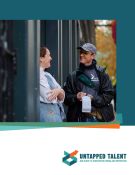 Training needs come with needs for support, as leaders and employers look for funding, changes in policy, and communication from governments to help them build new or updated training plans.
Training needs come with needs for support, as leaders and employers look for funding, changes in policy, and communication from governments to help them build new or updated training plans.
One avenue for support that we are excited to explore with our supportive employer partners is the Untapped Talent guidebook, which is a guide for businesses wanting to adopt inclusive hiring, training, and retention practices in their organizations. The information in this book will be valuable in helping businesses and non-profits to assess how successful their training model is in creating a workforce that can help them become a stronger organization post-COVID.
2. Adaptability and resilience are key
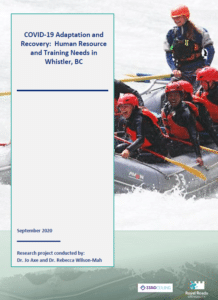 Needing to adapt to changing environments is a universal condition. When looking at Whistler’s COVID-19 recovery, the researchers spoke a lot about the need for businesses and non-profits to hang onto their ability to remain flexible and responsive in the fact of changing demands. It’s clear that many businesses and non-profits have had to do this to survive, often changing their business or service model and making new investments in technology and health and safety.
Needing to adapt to changing environments is a universal condition. When looking at Whistler’s COVID-19 recovery, the researchers spoke a lot about the need for businesses and non-profits to hang onto their ability to remain flexible and responsive in the fact of changing demands. It’s clear that many businesses and non-profits have had to do this to survive, often changing their business or service model and making new investments in technology and health and safety.
One challenge that Whistler and many other communities are collectively facing is a smaller talent pool. As we wait for international travel and changes to foreign worker policies, local businesses are organizations are having to adapt to recruiting a different population — local and Canadian workers. This means they will also inevitably have to adapt recruitment, hiring, and retention to accommodate the needs of this group.
Part of being adaptable means taking ownership of being resilient and empowering yourself through the identity of being resilient. That means the tools to survive and bounce back are within your reach. As for the blocks of building resilience in crisis, the researchers pointed to clear communication, feeling of working on something as a collective, building relationships, and feeling connected to the wider community.
Of course, being reactive isn’t a long-term solution to remaining in business, and doesn’t speak to external factors influencing whether or not you have the option to be adaptable or resilient. However, quick-thinking, problem solving, and investing in being flexible will help a business or non-profit adapt in changing times.
3. There has to be a plan for everything
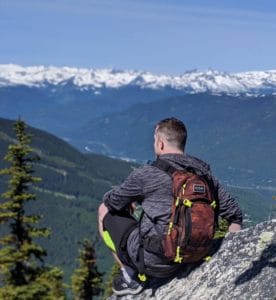 How do you plan for a global pandemic to disrupt basically every system and process we rely on to make the world go ’round? Well, the irony is, you can’t, but also planning is critical to ensuring that needs are met in COVID-19 recovery in Whistler.
How do you plan for a global pandemic to disrupt basically every system and process we rely on to make the world go ’round? Well, the irony is, you can’t, but also planning is critical to ensuring that needs are met in COVID-19 recovery in Whistler.
In this report, the researchers highlighted the need for solid, yet flexible planning. When chaos threatens, leaders are called on to tell everyone what needs to be done to lead their teams through — they have to come up with a plan. This plan must be communicated clearly and widely, and everyone needs to understand their part. Leaders must give each player the tools they need to execute their piece of the plan through training and compassionate support. And the plan must be built to absorb the unknowns and contingent situations.
It can often feel like we are at the mercy of others’ plans. This feeling of being in limbo can be debilitating on our mental health and also on our ability to feel in control over our own destinies. But that doesn’t mean we can’t make our own plans, leaving room for responding and reacting to the larger scale. Doing so will mean that more businesses and non-profits will be able to make it to the other side.
4. Trust builds empathy, and everyone needs more empathy
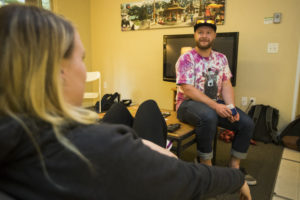 Trust was a common theme that came up for the RRU researchers as they spoke to various Whistler businesses and non-profits in June 2020. Not only did they have to have trust in all levels of government to be able to steer us through this, but they also had to build trust in their organization, with their employees, with their customers or users, and with other businesses and non-profits.
Trust was a common theme that came up for the RRU researchers as they spoke to various Whistler businesses and non-profits in June 2020. Not only did they have to have trust in all levels of government to be able to steer us through this, but they also had to build trust in their organization, with their employees, with their customers or users, and with other businesses and non-profits.
Building trust takes empathy. It takes acknowledging that the person you’re trying to deal with has their own experiences and understandings that inform them and treating them as an individual. An empathetic approach to recovery means that businesses and non-profits will need to make this part of their core values and make it a permanent part of their practice.
Mental health challenges are one of the major examples of a growing need for employers to take on a more compassionate approach with their workers. There is greater understanding of how situations and environments contribute to an individual’s mental well-being, and how the pandemic has affected people’s ability to cope with uncertainty and fear. Going forward, businesses and non-profits will be asked to recognize that the mental health and well-being of their employees is one of their biggest assets they have in Whistler COVID recovery, and will be asked to invest in them.
5. Community is at the centre of it all
Our final lesson learned involves the central role of community in bringing together all of the other takeaways from this research. The businesses and non-profits that contributed to this research didn’t have any interest in a recovery that did not involve the collective health of the community we live in; for them, community health was a major driver for wanting to succeed, as well as a major factor in how they’ll get there, and most voiced a strong desire for collaboration.
Drs. Axe and Wilson-Mah demonstrated the importance of community with their 4 C Model for supporting COVID-19 workplace adaptation and recovery. In their model, the four “Cs” are: communicate, coordinate, connect, and community.
“The role of the community was far reaching, and was seen in comments about normalizing a collective approach to safety guidelines in Whistler, rebuilding organizations and livelihoods, training to re-establish values, supporting a collective resilience, and making sure the mental health of the community was considered when adopting strategies for the physical safety of its members. The overarching consideration, when reflecting on the community, was that of remaining flexible to the demands of the changing physical, social, and emotional environment, and doing things differently.”

